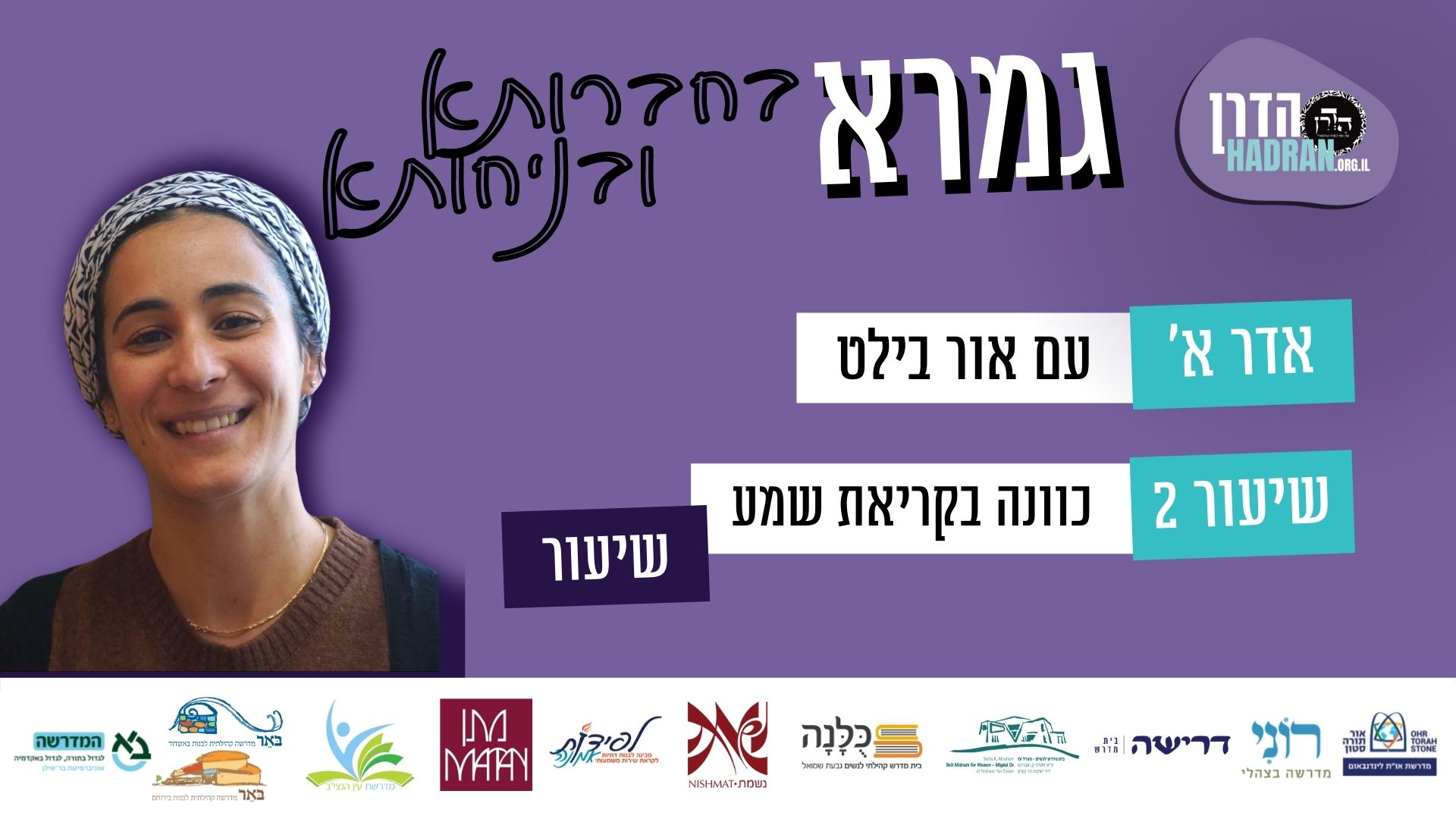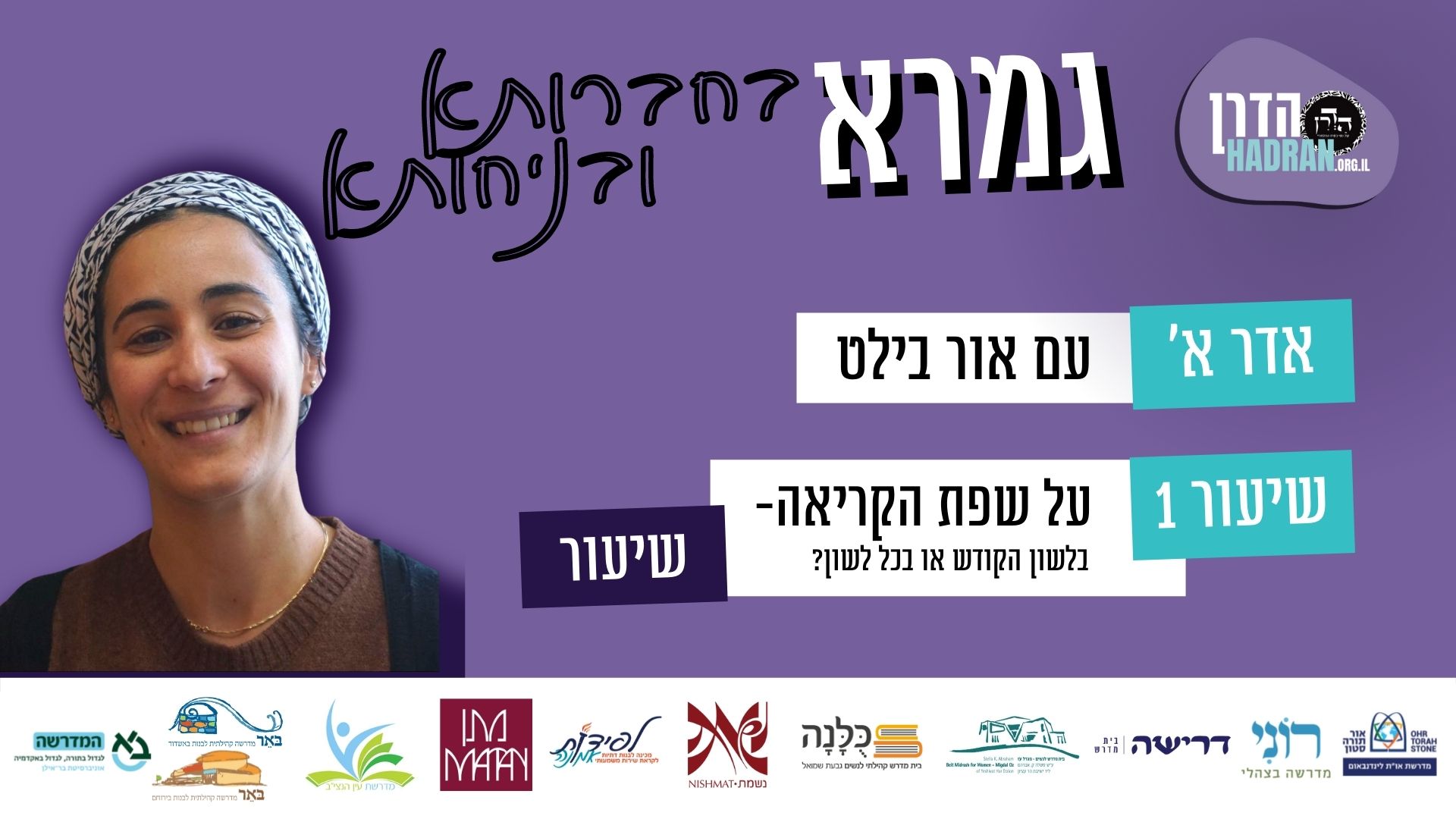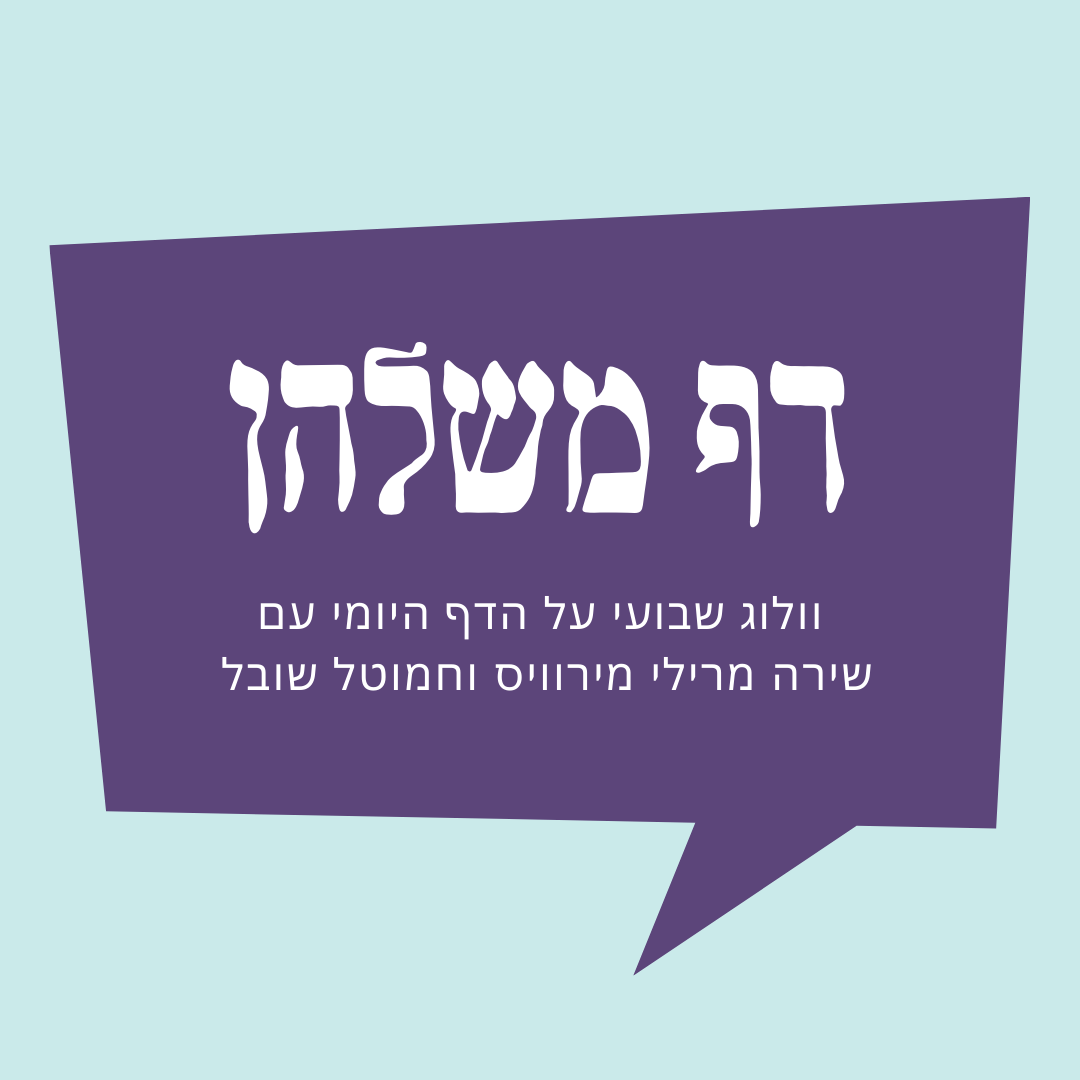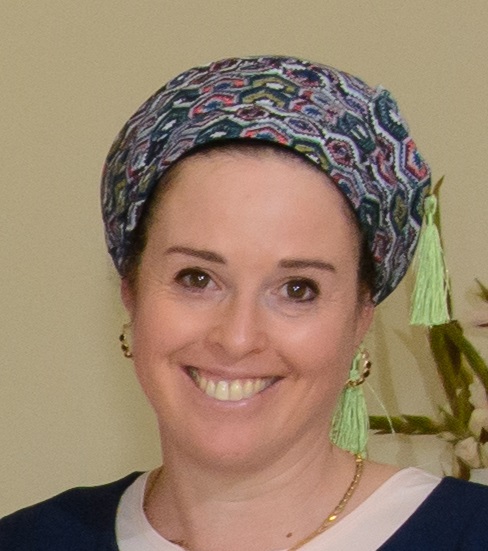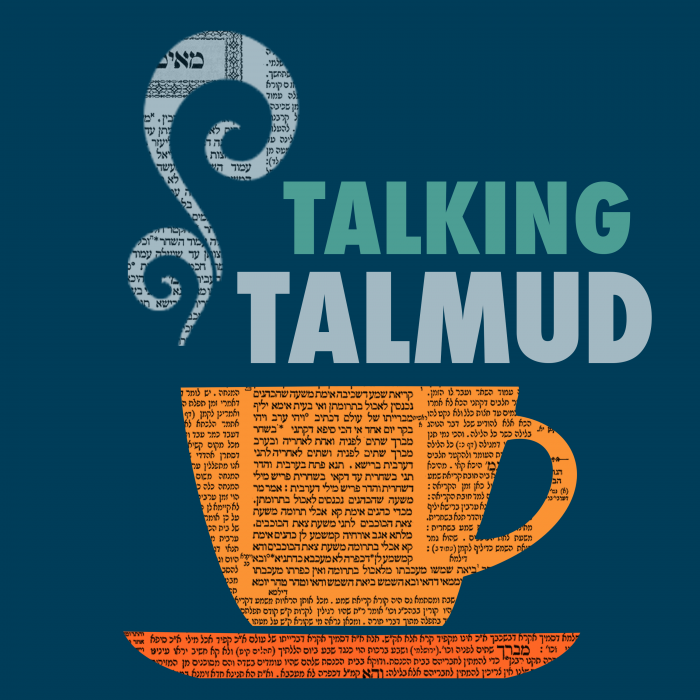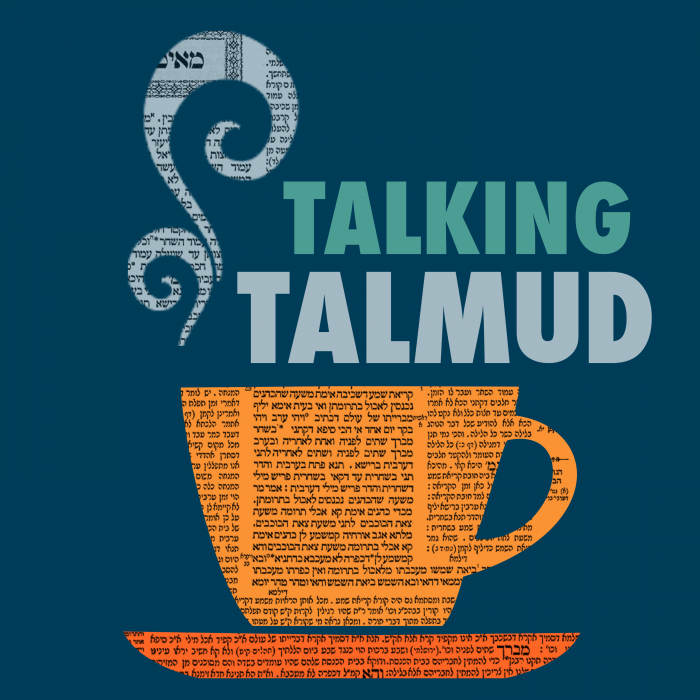מה מברכים על פת הבאה בכיסנין? מה נחשב כסיום לסעודה ובכך אם רוצים לאכול עוד, צריך לברך ברכה חדשה? האם יש הבדל אם מתארחים אצל מישהו אחר? למה? האם ברכה על יין בתחילת סעודה פוטר יין ששותים לאחר שסיימו לאכול (לפני שברכו ברכת המזון)? האם זה תלוי אם זה חג, שבת או יום חול? למה? האם זה תלוי אם הברכה היתה על יין לפני הסעודה או אפילו באמצע הסעודה? האם ברכה על הפת פוטרת את פרפרת הפת – מאכלים שאולכים לפני הסעודה? האם ברכה על פרפרת פוטרת את הפת? אם יושבים ביחד האם אחד מברך לכולם או כל אחד מברך ברכה לעצמו/ה? האם יש הבדל אם יושבים או מסובים?
רוצה להקדיש שיעור?
כלים
העמקה
רוצה להבין מה באמת קורה מתחת לפני השטח של הסוגיה?
שיעורים, פודקאסטים והרחבות של מיטב המורות שלנו יפתחו לך עוד זוויות וכיווני חשיבה.
חדשה בלימוד הגמרא?
זה הדף הראשון שלך? איזו התרגשות עצומה! יש לנו בדיוק את התכנים והכלים שיעזרו לך לעשות את הצעדים הראשונים ללמידה בקצב וברמה שלך, כך תוכלי להרגיש בנוח גם בתוך הסוגיות המורכבות ומאתגרות.
פסיפס הלומדות שלנו
גלי את קהילת הלומדות שלנו, מגוון נשים, רקעים וסיפורים. כולן חלק מתנועה ומסע מרגש ועוצמתי.
ברכות מב
דְּגוֹרֵם בְּרָכָה לְעַצְמוֹ.
as it causes a blessing itself. It is so significant, that one recites a blessing over it together with other blessings like kiddush and havdala, even though he does not particularly want to drink it. During a meal too, a blessing is recited over the wine and it is not exempted by the blessing over the bread.
רַב הוּנָא אֲכַל תְּלֵיסַר רִיפְתֵי בְּנֵי תְּלָתָא תְּלָתָא בְּקַבָּא וְלָא בָּרֵיךְ. אֲמַר לֵיהּ רַב נַחְמָן: עָדֵי כַּפְנָא! אֶלָּא כֹּל שֶׁאֲחֵרִים קוֹבְעִים עָלָיו סְעוּדָה, צָרִיךְ לְבָרֵךְ.
As the Gemara mentioned bread that comes as dessert, it now relates that Rav Huna ate thirteen substantially sized, sweetened loaves, three loaves per kav of flour, and he did not recite Grace after Meals because they were not genuine bread. Rav Naḥman said to him: That is hunger. One does not typically eat that much merely as dessert. Rather, over anything which is substantial enough to satiate and others base a meal upon it, one must recite Grace after Meals.
רַב יְהוּדָה הֲוָה עָסֵיק לֵיהּ לִבְרֵיהּ בֵּי רַב יְהוּדָה בַּר חֲבִיבָא. אַיְיתוֹ לְקַמַּיְיהוּ פַּת הַבָּאָה בְּכִסָנִין. כִּי אֲתָא, שַׁמְעִינְהוּ דְּקָא מְבָרְכִי ״הַמּוֹצִיא״. אָמַר לְהוּ: מַאי ״צִיצִי״ דְּקָא שָׁמַעְנָא? דִּילְמָא ״הַמּוֹצִיא לֶחֶם מִן הָאָרֶץ״ קָא מְבָרְכִיתוּ? אָמְרִי לֵיהּ: אִין. דְּתַנְיָא, רַבִּי מוּנָא אָמַר מִשּׁוּם רַבִּי יְהוּדָה: פַּת הַבָּאָה בְּכִסָנִין מְבָרְכִין עָלֶיהָ ״הַמּוֹצִיא״, וְאָמַר שְׁמוּאֵל: הֲלָכָה כְּרַבִּי מוּנָא.
The Gemara also relates: Rav Yehuda was engaged in preparations for his son’s wedding at the house of Rav Yehuda bar Ḥaviva when they brought bread that comes as dessert before them. When it arrived, he heard them reciting: Who brings forth bread from the earth. He said to them: What is this tzitzi sound that I hear? Perhaps you are reciting: Who brings forth bread from the earth? They said to him: Yes, indeed, as it was taught in a baraita: Rabbi Mona said in the name of Rabbi Yehuda: Over bread that comes as dessert, one recites: Who brings forth bread from the earth. And Shmuel said: The halakha is in accordance with the opinion of Rabbi Mona.
אָמַר לְהוּ: אֵין הֲלָכָה כְּרַבִּי מוּנָא אִתְּמַר. אָמְרִי לֵיהּ: וְהָא מָר הוּא דְּאָמַר מִשְּׁמֵיהּ דִּשְׁמוּאֵל לַחְמָנִיּוֹת מְעָרְבִין בָּהֶן, וּמְבָרְכִין עֲלֵיהֶן ״הַמּוֹצִיא״? שָׁאנֵי הָתָם דְּקָבַע סְעוֹדְתֵּיהּ עֲלַיְיהוּ, אֲבָל הֵיכָא דְּלָא קָבַע סְעוֹדְתֵּיהּ עֲלַיְיהוּ — לָא.
Rav Yehuda said to them: You are mistaken. Actually, it was stated that Shmuel said: The halakha is not in accordance with the opinion of Rabbi Mona. They said to him: But aren’t you, Master, the one who said in the name of Shmuel with regard to wafers: One may establish an eiruv, the joining of courtyards, to permit carrying in a shared courtyard and the joining of cooked foods, to permit cooking on a festival for Shabbat, with them and recite over them: Who brings forth bread from the earth. Why is that the blessing over those wafers? They too are sweetened bread that comes as dessert. He answered them: It is different there as he based his meal upon them, but here, where one did not base his meal upon them, no, he does not recite: Who brings forth bread from the earth.
רַב פָּפָּא אִיקְּלַע לְבֵי רַב הוּנָא בְּרֵיהּ דְּרַב נָתָן. בָּתַר דְּגָמְרִי סְעוֹדְתַּיְיהוּ אַיְיתוֹ לְקַמַּיְיהוּ מִידֵּי לְמֵיכַל שָׁקֵל רַב פָּפָּא וְקָא אָכֵיל. אָמְרִי לֵיהּ: לָא סָבַר לַהּ מָר גָּמַר אָסוּר מִלֶּאֱכוֹל? אָמַר לְהוּ: ״סִלֵּק״ אִתְּמַר.
The Gemara relates: Rav Pappa happened to come to the house of Rav Huna, son of Rav Natan. After they finished their meal, they brought before them something to eat. Rav Pappa took this food item and ate it without reciting a blessing. They said to him: Do you, Master, not hold that once one finished his meal he is forbidden to eat again without reciting a blessing? He said to them that in the correct version of that halakha, it is stated: Removed. One need recite a second blessing only when eating after the table was removed from before him.
רָבָא וְרַבִּי זֵירָא אִיקְּלַעוּ לְבֵי רֵישׁ גָּלוּתָא. לְבָתַר דְּסַלִּיקוּ תַּכָּא מִקַּמַּיְיהוּ שַׁדַּרוּ לְהוּ רִיסְתָּנָא מִבֵּי רֵישׁ גָּלוּתָא. רָבָא אָכֵיל וְרַבִּי זֵירָא לָא אָכֵיל. אֲמַר לֵיהּ: לָא סָבַר לַהּ מָר סִלֵּק אָסוּר מִלֶּאֱכוֹל? אֲמַר לֵיהּ: אֲנַן אַתַּכָּא דְּרֵישׁ גָּלוּתָא סָמְכִינַן.
Similarly, the Gemara relates: Rava and Rabbi Zeira happened to come to the house of the Exilarch. After the meal, when they removed the table from before them, a portion [ristena] of food was sent to them from the house of the Exilarch. Rava ate it and Rabbi Zeira did not eat it. Rabbi Zeira said to Rava: Do you, Master, not hold that once the table was removed, he is forbidden to eat? Rava said to him: We are dependent upon the table of the Exilarch, and so long as he has not completed his meal, his guests have not completed their meals either.
אָמַר רַב: הָרָגִיל בְּשֶׁמֶן — שֶׁמֶן מְעַכְּבוֹ. אָמַר רַב אָשֵׁי: כִּי הָוֵינַן בֵּי רַב כָּהֲנָא, אָמַר לַן: כְּגוֹן אֲנַן דִּרְגִילִינַן בְּמִשְׁחָא — מִשְׁחָא מְעַכְּבָא לַן. וְלֵית הִלְכְתָא כְּכׇל הָנֵי שְׁמַעְתָּתָא, אֶלָּא כִּי הָא דְּאָמַר רַבִּי חִיָּיא בַּר אָשֵׁי אָמַר רַב: שָׁלֹשׁ תְּכִיפוֹת הֵן: תֵּכֶף לִסְמִיכָה שְׁחִיטָה, תֵּכֶף לִגְאוּלָּה תְּפִלָּה, תֵּכֶף לִנְטִילַת יָדַיִם בְּרָכָה.
Rav said: One who is accustomed to applying fragrant oil to his hands after meals, failure to apply that oil delays the end of his meal and he is not considered to have finished his meal and is not required to recite a blessing before continuing to eat. Similarly, Rav Ashi said: When we were in the house of Rav Kahana, he said to us: We, for example, who are accustomed to oil, failure to apply that oil delays the end of the meal for us. Nevertheless, the Gemara concludes: And the halakha is not in accordance with all of these statements and the end of the meal is not determined by those factors. Rather, it is determined by that which Rabbi Ḥiyya bar Ashi said that Rav said: There are three pairs that immediately follow each other: Immediately following placing hands on the head of a sacrifice, is its slaughter; immediately following the blessing of redemption recited after Shema, is the Amida prayer; and immediately following the ritual washing of the hands after a meal, is the blessing of Grace after Meals.
אָמַר אַבָּיֵי, אַף אָנוּ נֹאמַר: תֵּכֶף לְתַלְמִידֵי חֲכָמִים בְּרָכָה. שֶׁנֶּאֱמַר: ״וַיְבָרְכֵנִי ה׳ בִּגְלָלֶךָ״. אִיבָּעֵית אֵימָא מֵהָכָא, שֶׁנֶּאֱמַר: ״וַיְבָרֶךְ ה׳ אֶת בֵּית הַמִּצְרִי בִּגְלַל יוֹסֵף״.
Abaye said that on a similar note, we too will say: Immediately following the entrance of Torah scholars into a house, a blessing rests upon that house, as it is stated with regard to Laban and Jacob: “The Lord has blessed me because of you” (Genesis 30:27). If you wish, say instead, that the proof is from here, as it is stated: “And it was from when he placed him in charge of his house and over all that he owned, the Lord blessed the house of the Egyptian on account of Joseph” (Genesis 39:5).
מַתְנִי׳ בֵּרַךְ עַל הַיַּיִן שֶׁלִּפְנֵי הַמָּזוֹן — פָּטַר אֶת הַיַּיִן שֶׁלְּאַחַר הַמָּזוֹן. בֵּרַךְ עַל הַפַּרְפֶּרֶת שֶׁלִּפְנֵי הַמָּזוֹן — פָּטַר אֶת הַפַּרְפֶּרֶת שֶׁלְּאַחַר הַמָּזוֹן. בֵּרַךְ עַל הַפַּת — פָּטַר אֶת הַפַּרְפֶּרֶת. עַל הַפַּרְפֶּרֶת — לֹא פָּטַר אֶת הַפַּת. בֵּית שַׁמַּאי אוֹמְרִים: אַף לֹא מַעֲשֵׂה קְדֵרָה.
MISHNA: This mishna explains those cases and those circumstances in which blessings recited over particular foods exempt other foods at the meal from the requirement to recite a blessing over them. One who recited a blessing over the wine that one drank before the meal, with that blessing he exempted the wine that he drinks after the meal. Similarly, one who recited a blessing over the appetizers that one ate before the meal, with that blessing he exempted the appetizers that he eats after the meal. One who recited a blessing over the bread exempted the appetizers, as they are considered secondary to the bread. However, one who recited a blessing over the appetizers did not exempt the bread. Beit Shammai say: The blessing recited over the appetizers did not exempt even a cooked dish that he eats during the meal.
הָיוּ יוֹשְׁבִין — כׇּל אֶחָד מְבָרֵךְ לְעַצְמוֹ. הֵסַבּוּ — אֶחָד מְבָרֵךְ לְכוּלָּן.
An additional halakha is cited: If several people were sitting to eat not in the framework of a joint meal, each recites a blessing for himself. If they were reclined on divans to eat, which renders it a joint meal, one recites a blessing on behalf of them all.
בָּא לָהֶם יַיִן בְּתוֹךְ הַמָּזוֹן — כׇּל אֶחָד וְאֶחָד מְבָרֵךְ לְעַצְמוֹ. אַחַר הַמָּזוֹן — אֶחָד מְבָרֵךְ לְכוּלָּם. וְהוּא אוֹמֵר עַל הַמּוּגְמָר, וְאַף עַל פִּי שֶׁאֵין מְבִיאִין אֶת הַמּוּגְמָר אֶלָּא לְאַחַר סְעוּדָה.
Additionally: If wine came before them during the meal, each and every diner recites a blessing over the wine for himself. If the wine came after the meal, one recites a blessing on behalf of them all. And he, who recited the blessing over the wine, also says the blessing over the incense [mugmar], although they only bring the incense to the diners after the meal.
גְּמָ׳ אָמַר רַבָּה בַּר בַּר חָנָה אָמַר רַבִּי יוֹחָנָן: לֹא שָׁנוּ אֶלָּא בְּשַׁבָּתוֹת וְיָמִים טוֹבִים, הוֹאִיל וְאָדָם קוֹבֵעַ סְעוּדָּתוֹ עַל הַיַּיִן. אֲבָל בִּשְׁאָר יְמוֹת הַשָּׁנָה, מְבָרֵךְ עַל כׇּל כּוֹס וָכוֹס.
GEMARA: With regard to the mishna’s statement that wine that precedes a meal exempts wine that follows a meal, Rabba bar bar Ḥana said that Rabbi Yoḥanan said: This halakha was only taught with regard to Shabbat and Festivals, since, because one can continue drinking at his leisure, one bases his meal on the wine. However, during the rest of the days of the year, one who drinks wine at a meal recites a blessing over each and every cup, as his original intention was not to drink a lot.
אִתְּמַר נָמֵי: אָמַר רַבָּה בַּר מָרִי אָמַר רַבִּי יְהוֹשֻׁעַ בֶּן לֵוִי: לֹא שָׁנוּ אֶלָּא בְּשַׁבָּתוֹת וְיָמִים טוֹבִים, וּבְשָׁעָה שֶׁאָדָם יוֹצֵא מִבֵּית הַמֶּרְחָץ, וּבִשְׁעַת הַקָּזַת דָּם, הוֹאִיל וְאָדָם קוֹבֵעַ סְעוּדָּתוֹ עַל הַיַּיִן. אֲבָל בִּשְׁאָר יְמוֹת הַשָּׁנָה — מְבָרֵךְ עַל כׇּל כּוֹס וָכוֹס.
It was also stated: Rabba bar Mari said that Rabbi Yehoshua ben Levi said: This was only taught in the mishna with regard to Shabbat and Festivals, and when a person emerges tired from the bathhouse, and wishes to eat and rest, and during bloodletting, after which one tends to drink a lot, since on these occasions one typically bases his meal on wine. However, during the rest of the days of the year, one who drinks wine at a meal recites a blessing over each and every cup.
רַבָּה בַּר מָרִי אִיקְּלַע לְבֵי רָבָא בְּחוֹל. חַזְיֵיהּ דְּבָרֵיךְ לִפְנֵי הַמָּזוֹן, וַהֲדַר בָּרֵיךְ לְאַחַר הַמָּזוֹן. אֲמַר לֵיהּ: יִישַׁר. וְכֵן אָמַר רַבִּי יְהוֹשֻׁעַ בֶּן לֵוִי.
The Gemara relates that Rabba bar Mari happened to come to the house of Rava during the week. He saw him recite a blessing over wine before the meal, and again recite a blessing on the wine after the meal. He said to him: Well done. And so too, Rabbi Yehoshua ben Levi said that this was proper conduct.
רַב יִצְחָק בַּר יוֹסֵף אִיקְּלַע לְבֵי אַבָּיֵי בְּיוֹם טוֹב. חַזְיֵיהּ דְּבָרֵיךְ אַכֹּל כָּסָא וְכָסָא. אֲמַר לֵיהּ: לָא סָבַר לַהּ מָר לְהָא דְּרַבִּי יְהוֹשֻׁעַ בֶּן לֵוִי?! אֲמַר לֵיהּ: נִמְלָךְ אֲנָא.
The Gemara also relates: Rabbi Yitzḥak bar Yosef happened to come to the house of Abaye on a Festival. He saw that he recited a blessing over each and every cup of wine. Rabbi Yitzḥak said to him: Does the Master not hold in accordance with that halakha of Rabbi Yehoshua ben Levi, who said that one blessing is sufficient? Abaye said to him: My original intention was not to base my meal upon wine and with each cup I change my mind and decide to drink it. Even Rabbi Yehoshua ben Levi would agree that under those circumstances, one must recite a blessing over each and every cup.
אִיבַּעְיָא לְהוּ: בָּא לָהֶם יַיִן בְּתוֹךְ הַמָּזוֹן מַהוּ שֶׁיִּפְטוֹר אֶת הַיַּיִן שֶׁלְּאַחַר הַמָּזוֹן? אִם תִּימְצֵי לוֹמַר בֵּרַךְ עַל הַיַּיִן שֶׁלִּפְנֵי הַמָּזוֹן פּוֹטֵר אֶת הַיַּיִן שֶׁלְּאַחַר הַמָּזוֹן — מִשּׁוּם דְּזֶה לִשְׁתּוֹת וְזֶה לִשְׁתּוֹת. אֲבָל הָכָא — דְּזֶה לִשְׁתּוֹת, וְזֶה לִשְׁרוֹת — לָא. אוֹ דִילְמָא לָא שְׁנָא.
A dilemma was raised before the Sages: If wine came out to them during the meal, what is the halakha with regard to exempting the wine after the meal from a blessing? The dilemma is as follows: If you say: One who recited a blessing over the wine that one drank before the meal, with that blessing he exempted the wine that he drinks after the meal, perhaps that is because the purpose of drinking this, wine before the meal, is to drink, and that, wine after the meal, is to drink for its own sake. However, here, where the purpose of drinking this, the wine after the meal, is to drink and that, the wine during the meal, is to moisten the food and to facilitate its consumption, no. The blessing on one cannot exempt the other. Or perhaps there is no difference, and all drinking is considered the same.
רַב אָמַר: פּוֹטֵר, וְרַב כָּהֲנָא אָמַר: אֵינוֹ פּוֹטֵר. רַב נַחְמָן אָמַר: פּוֹטֵר, וְרַב שֵׁשֶׁת אָמַר: אֵינוֹ פּוֹטֵר. רַב הוּנָא וְרַב יְהוּדָה וְכׇל תַּלְמִידֵי דְּרַב אָמְרִי: אֵינוֹ פּוֹטֵר. אֵיתִיבֵיהּ רָבָא לְרַב נַחְמָן: בָּא לָהֶם יַיִן בְּתוֹךְ הַמָּזוֹן — כׇּל אֶחָד וְאֶחָד מְבָרֵךְ לְעַצְמוֹ. לְאַחַר הַמָּזוֹן — אֶחָד מְבָרֵךְ לְכוּלָּם. אֲמַר לֵיהּ, הָכִי קָאָמַר: אִם לֹא בָּא לָהֶם יַיִן בְּתוֹךְ הַמָּזוֹן אֶלָּא לְאַחַר הַמָּזוֹן, אֶחָד מְבָרֵךְ לְכוּלָּם.
Opinions differed: Rav said: It exempts, and Rav Kahana said: It does not exempt. Rav Naḥman said: It exempts, and Rav Sheshet said: It does not exempt. Rav Huna and Rav Yehuda and all the students of Rav said: It does not exempt. Rava raised an objection to Rav Naḥman from our mishna: If wine came before them during the meal, each and every diner recites a blessing over the wine for himself. If the wine came after the meal, one recites a blessing on behalf of them all. Apparently, even though they recited a blessing over wine during the course of the meal, they must recite a blessing over the wine after the meal as well. Rav Naḥman said to him: The mishna says as follows: There are two independent cases. The second case is: If wine did not come before them during the meal, but only after the meal, one recites a blessing on behalf of them all.
בֵּרַךְ עַל הַפַּת, פָּטַר אֶת הַפַּרְפֶּרֶת. עַל הַפַּרְפֶּרֶת, לֹא פָּטַר אֶת הַפַּת. בֵּית שַׁמַּאי אוֹמְרִים: אַף לֹא מַעֲשֵׂה קְדֵרָה.
We learned in the mishna: One who recited a blessing over the bread exempted the appetizers, as they are considered secondary to the bread. However, one who recited a blessing over the appetizers did not exempt the bread. Beit Shammai say: The blessing recited over the appetizers did not exempt even a cooked dish that he eats during the meal.
אִיבַּעְיָא לְהוּ: בֵּית שַׁמַּאי אַרֵישָׁא פְּלִיגִי, אוֹ דִילְמָא אַסֵּיפָא פְּלִיגִי? דְּקָאָמַר תַּנָּא קַמָּא בֵּרַךְ עַל הַפַּת — פָּטַר אֶת הַפַּרְפֶּרֶת, וְכׇל שֶׁכֵּן מַעֲשֵׂה קְדֵרָה. וְאָתֵי בֵּית שַׁמַּאי לְמֵימַר לָא מִיבַּעְיָא פַּרְפֶּרֶת דְּלָא פָּטְרָה לְהוּ פַּת, אֶלָּא אֲפִילּוּ מַעֲשֵׂה קְדֵרָה נָמֵי לָא פָּטְרָה. אוֹ דִילְמָא אַסֵּיפָא פְּלִיגִי, דְּקָתָנֵי: בֵּרַךְ עַל הַפַּרְפֶּרֶת — לֹא פָּטַר אֶת הַפַּת. פַּת הוּא דְּלָא פָּטַר אֲבָל מַעֲשֵׂה קְדֵרָה — פָּטַר. וְאָתוּ בֵּית שַׁמַּאי לְמֵימַר וַאֲפִילּוּ מַעֲשֵׂה קְדֵרָה נָמֵי לָא פָּטַר.
With regard to this case, a dilemma was raised before the Sages: Do Beit Shammai disagree with the first clause in the mishna or with the latter clause, as it may be explained in both ways? It can be understood that the first tanna says: One who recited a blessing over the bread exempted the appetizers and all the more so it exempted a cooked dish. And Beit Shammai come to say: It goes without saying that the blessing over bread does not exempt appetizers; as the blessing over bread does not even exempt a cooked dish. Or perhaps they disagree with the latter clause, as it was taught: One who recited a blessing over the appetizers did not exempt the bread. By inference, the blessing did not exempt bread, but it did exempt a cooked dish. And Beit Shammai come to say that the blessing over the appetizers did not exempt even a cooked dish.
תֵּיקוּ.
The Gemara concludes: Let it stand, as this dilemma remains unresolved.
הָיוּ יוֹשְׁבִין כׇּל אֶחָד וְאֶחָד כּוּ׳. הֵסַבּוּ — אִין, לֹא הֵסַבּוּ — לָא. וּרְמִינְהוּ: עֲשָׂרָה שֶׁהָיוּ הוֹלְכִים בַּדֶּרֶךְ, אַף עַל פִּי שֶׁכּוּלָּם אוֹכְלִים מִכִּכָּר אֶחָד — כׇּל אֶחָד וְאֶחָד מְבָרֵךְ לְעַצְמוֹ. יָשְׁבוּ לֶאֱכוֹל, אַף עַל פִּי שֶׁכָּל אֶחָד וְאֶחָד אוֹכֵל מִכִּכָּרוֹ — אֶחָד מְבָרֵךְ לְכוּלָּם. קָתָנֵי ״יָשְׁבוּ״ אַף עַל פִּי שֶׁלֹּא הֵסַבּוּ!
The mishna distinguished between a case where several people were sitting to eat, which is not a joint meal, and each and every diner recites a blessing for himself; and a case where they were reclined on divans, which renders it a joint meal, and one recites a blessing on behalf of all of them. The Gemara infers: If they reclined, yes, it is considered a joint meal; if they did not recline, no. And the Gemara raises a contradiction: Ten people who were walking on the road, even if they are all eating from one loaf, each and every one recites a blessing for himself. If they sat to eat, even if each and every one is eating from his own loaf, one recites a blessing on behalf of them all as it is considered a joint meal. In any case, it was taught: If they sat to eat, even though they did not recline. Apparently, sitting together is enough to render it a joint meal and reclining is not required.
אָמַר רַב נַחְמָן בַּר יִצְחָק: כְּגוֹן דְּאָמְרִי ״נֵיזִיל וְנֵיכוֹל לַחְמָא בְּדוּךְ פְּלָן״.
Rav Naḥman bar Yitzḥak said: With regard to those walking along the road, it was in a case where they said: Let us go and eat in such-and-such a place. Since they designated a specific location to eat together in advance, it is considered a joint meal.
כִּי נָח נַפְשֵׁיהּ דְּרַב, אֲזוּל תַּלְמִידֵיהּ בָּתְרֵיהּ. כִּי הָדְרִי, אָמְרִי: נֵיזִיל וְנֵיכוּל לַחְמָא אַנְּהַר דָּנָק. בָּתַר דְּכָרְכִי, יָתְבִי וְקָא מִיבַּעְיָא לְהוּ: ״הֵסַבּוּ״ דַּוְקָא תְּנַן, אֲבָל יָשְׁבוּ לָא, אוֹ דִילְמָא כֵּיוָן דְּאָמְרִי ״נֵיזִיל וְנֵיכוֹל רִיפְתָּא בְּדוּכְתָּא פְּלָנִיתָא״ — כִּי הֵסַבּוּ דָּמֵי? לָא הֲוָה בִּידַיְיהוּ.
On a similar note, the Gemara relates: When Rav died, his students went after his casket to the city where he was to be buried. When they returned, they said: Let us go and eat bread on the banks of the Dannak River. After they ate, they sat, and raised a dilemma: Did we learn in the mishna specifically if they reclined, it is considered a joint meal; however, if they merely sat together, no, it is not considered a joint meal? Or perhaps, since they said: Let us go and eat in such-and-such a place, it is considered as if they reclined? It was not within their capability to resolve this dilemma.
Rav Adda bar Ahava stood,


